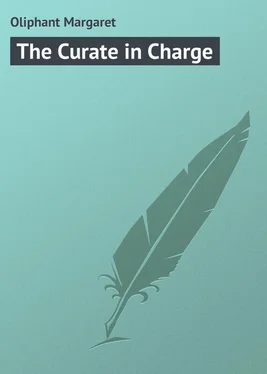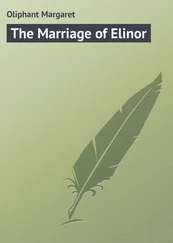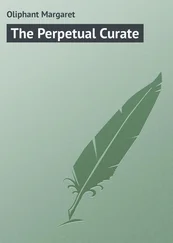Margaret Oliphant - The Curate in Charge
Здесь есть возможность читать онлайн «Margaret Oliphant - The Curate in Charge» — ознакомительный отрывок электронной книги совершенно бесплатно, а после прочтения отрывка купить полную версию. В некоторых случаях можно слушать аудио, скачать через торрент в формате fb2 и присутствует краткое содержание. ISBN: , Жанр: foreign_prose, на английском языке. Описание произведения, (предисловие) а так же отзывы посетителей доступны на портале библиотеки ЛибКат.
- Название:The Curate in Charge
- Автор:
- Жанр:
- Год:неизвестен
- ISBN:http://www.gutenberg.org/ebooks/42045
- Рейтинг книги:5 / 5. Голосов: 1
-
Избранное:Добавить в избранное
- Отзывы:
-
Ваша оценка:
- 100
- 1
- 2
- 3
- 4
- 5
The Curate in Charge: краткое содержание, описание и аннотация
Предлагаем к чтению аннотацию, описание, краткое содержание или предисловие (зависит от того, что написал сам автор книги «The Curate in Charge»). Если вы не нашли необходимую информацию о книге — напишите в комментариях, мы постараемся отыскать её.
The Curate in Charge — читать онлайн ознакомительный отрывок
Ниже представлен текст книги, разбитый по страницам. Система сохранения места последней прочитанной страницы, позволяет с удобством читать онлайн бесплатно книгу «The Curate in Charge», без необходимости каждый раз заново искать на чём Вы остановились. Поставьте закладку, и сможете в любой момент перейти на страницу, на которой закончили чтение.
Интервал:
Закладка:
The air was full of the wild sweet freshness of the pines as she landed on the edge of the common; the seed pods on the gorse bushes were crackling in the heat, the ragged hedges on the roadside hung out long pennons of straggling branches, blossomed to the very tips with wild roses delicately sweet. Miss Maydew was not long in encountering the objects of her interest. As she went along to the rectory, carrying her large brown sunshade open in one hand, and her large white pocket-handkerchief to fan herself in the other, her ears and her eyes were alike attracted by a little group, under the shadow of a great tree just where the gorse and the pines ended. There were two tall girls in print frocks of the simplest character, and large hats of coarse straw; and seated on the root of the tree slightly raised above them, a plain little woman in a brown gown. Some well worn volumes were lying on the grass, but the book which one of the girls held in her hand, standing up in an attitude of indignant remonstrance, was a square slim book of a different aspect. The other held a huge pencil, one of those weapons red at one end and blue at the other which schoolboys love, which she twirled in her fingers with some excitement. Miss Maydew divined at once who they were, and walking slowly, listened. Their voices were by no means low, and they were quite unconscious of auditors and indifferent who might hear.
“What does ‘nice’ mean?” cried the elder, flourishing the book. “Why, is it not ladylike? If one is clever, and has a gift, is one not to use it? Not nice? I want to know what nice means?”
“My dear,” said the governess, “I wish you would not always be asking what everything means. A great many things are understood without explanation in good society – ”
“But we don’t know anything about good society, nor society at all. Why is it not nice for Mab to draw? Why is it unladylike?” cried the girl, her eyes sparkling. As for the other one, she shrugged her shoulders, and twirled her pencil, while Miss Brown looked at them with a feeble protestation, clasping her hands in despair.
“Oh, Cicely! never anything but why? – why?” she said, with lofty, yet pitying disapproval, “You may be sure it is so when I say it.” Then, leaving this high position for the more dangerous exercise of reason. “Besides, the more one thinks of it, the more improper it seems. There are drawings of gentlemen in that book. Is that nice, do you suppose? Gentlemen! Put it away; and, Mabel, I desire you never to do anything so very unladylike again.”
“But, Miss Brown!” said the younger; “there are a great many gentlemen in the world. I can’t help seeing them, can I?”
“A young lady who respects herself, and who has been brought up as she ought, never looks at gentlemen. No, you can’t help seeing them; but to draw them you must look at them; you must study them. Oh!” said Miss Brown with horror, putting up her hands before her eyes, “never let me hear of such a thing again. Give me the book, Cicely. It is too dreadful. I ought to burn it; but at least I must lock it away.”
“Don’t be afraid, Mab; she shan’t have the book,” said Cicely, with flashing eyes, stepping back, and holding the volume behind her in her clasped hands.
Just then Miss Maydew touched her on the sleeve. “I can’t be mistaken,” said the old lady; “you are so like your poor mother. Are you not Mr. St. John’s daughter? I suppose you don’t remember me?”
“It is Aunt Jane,” whispered Mab in Cicely’s ear, getting up with a blush, more conscious of the interruption than her sister was. The artist had the quickest eye.
“Yes, it is Aunt Jane; I am glad you recollect,” said Miss Maydew. “I have come all the way from town to pay you a visit, and that is not a small matter on such a hot day.”
“Papa will be very glad to see you,” said Cicely, looking up shy but pleased, with a flood of colour rushing over her face under the shade of her big hat. She was doubtful whether she should put up her pretty cheek to kiss the stranger, or wait for that salutation. She put out her hand, which seemed an intermediate measure. “I am Cicely,” she said, “and this is Mab; we are very glad to see you, Aunt Jane.”
Miss Brown got up hastily from under the tree, and made the stranger a curtsy. She gave a troubled glance at the girls’ frocks, which were not so fresh as they might have been. “You will excuse their schoolroom dresses,” she said, “we were not expecting any one; and it was so fine this morning that I indulged the young ladies, and let them do their work here. Ask your aunt, my dears, to come in.”
“Work!” said Miss Maydew, somewhat crossly, “I heard nothing but talk. Yes, I should like to go in, if you please. It is a long walk from the station – and so hot. Why, it is hotter here than in London, for all you talk about the country. There you can always get shade on one side of the street. This is like a furnace. I don’t know how you can live in such a blazing place;” and the old lady fanned herself with her large white handkerchief, a sight which brought gleams of mischief into Mab’s brown eyes. The red and blue pencil twirled more rapidly round than ever in her fingers, and she cast a longing glance at the sketch-book in Cicely’s hand. The girls were quite cool, and at their ease under the great beech-tree, which threw broken shadows far over the grass, – shadows which waved about as the big boughs did, and refreshed the mind with soft visionary fanning. Their big hats shadowed two faces, fresh and cool like flowers, with that downy bloom upon them which is the privilege of extreme youth. Miss Brown, who was concerned about their frocks, saw nothing but the creases in their pink and white garments; but what Miss Maydew saw was (she herself said) “a picture;” two fair slim things in white, with touches of pink, in soft shade, with bright patches of sunshine flitting about them, and the green background of the common rolled back in soft undulations behind. Poor lady! she was a great contrast to this picture; her cheeks flushed with the heat, her bonnet-strings loosed, fanning herself with her handkerchief. And this was what woke up those gleams of fun in Mab’s saucy eyes.
“But it is not hot,” said Mab. “How can you speak of a street when you are on the common? Don’t you smell the pines, Aunt Jane, and the honey in the gorse? Come under the tree near to us; it is not the least hot here.”
“You are a conceited little person,” said Aunt Jane.
“Oh no! she is not conceited – she is only decided in her opinions,” said Cicely. “You see we are not hot in the shade. But come in this way, the back way, through the garden, which is always cool. Sit down here in the summer-house, Aunt Jane, and rest. I’ll run and get you some strawberries. They are just beginning to get ripe.”
“You are a nice little person,” said Miss Maydew, sitting down with a sigh of relief. “I don’t want any strawberries, but you can come and kiss me. You are very like your poor mother. As for that thing, I don’t know who she is like – not our family, I am sure.”
“She is like the St. John’s,” said Cicely solemnly; “she is like papa.”
Mab only laughed. She did not mind what people said. “I’ll kiss you, too,” she said, “Aunt Jane, if you like; though you don’t like me.”
“I never said I didn’t like you. I am not so very fond of my family as that. One can see you are a pickle, though I don’t so much mind that either; but I like to look at this one, because she is like your poor mother. Dear, dear! Hester’s very eyes, and her cheeks like two roses, and her nice brown wavy hair!”
The girls drew near with eager interest, and Mab took up in her artist’s fingers a great handful of the hair which lay upon her sister’s shoulders. “Was mamma’s like that?” she said in awe and wonder; and Cicely, too, fixed her eyes upon her own bright locks reverentially. It gave them a new strange feeling for their mother to think that she had once been a girl like themselves. Strangest thought for a child’s mind to grasp; stranger even than the kindred thought, that one day those crisp half-curling locks, fall of threads of gold, would be blanched like the soft braids under Mrs. St. John’s cap. “Poor mamma!” they said simultaneously under their breath.
Читать дальшеИнтервал:
Закладка:
Похожие книги на «The Curate in Charge»
Представляем Вашему вниманию похожие книги на «The Curate in Charge» списком для выбора. Мы отобрали схожую по названию и смыслу литературу в надежде предоставить читателям больше вариантов отыскать новые, интересные, ещё непрочитанные произведения.
Обсуждение, отзывы о книге «The Curate in Charge» и просто собственные мнения читателей. Оставьте ваши комментарии, напишите, что Вы думаете о произведении, его смысле или главных героях. Укажите что конкретно понравилось, а что нет, и почему Вы так считаете.












